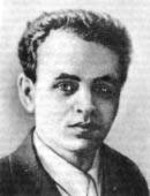
Gennady Shvedik
Gennady (Genakh) Shvedik – a Yiddish-Soviet poet, journalist, and teacher – was born in Bobruisk in 1914.
At the age of 12, Gennady Shvedik began to write naïve and child-like poetry in Yiddish, extolling the heroism of the new era. Eventually, his literary talent attracted the notice of the poet Izi Kharik, who was editor-in-chief of Der Shtern, a Yiddish daily published in Minsk. Both poets were deeply loyal to the ideas of communism, but Shvedik's works, which celebrated the deeds of heroes and patriots, were also suffused with romanticism. His first published poems, which were dedicated to the builders of a new city in the Far East, appeared in the Minsk newspaper Yunger Arbeter.
After graduating from the Minsk Pedagogical Institute in 1937, Shvedik, carried away by a wave of Soviet-Jewish patriotism, left for Birobidzhan, where he worked in construction and published poetry and prose in the local newspaper Birobidzhaner Shtern.
However, Shvedik soon returned to Minsk, where he taught at the Institute of Language, Literature, and the Arts of the Academy of Sciences of the Belorussian SSR. At the same time, he remained an active writer, combining his teaching duties with journalism. He headed the school section of the newspaper Pioner Belarusi.
Prior to the war, Shvedik published two collections of poetry: Start (1934) and Vershy (1939), as well as Our Jim – a long poem about an African-American boy, which was awarded a state prize Following the outbreak of the Soviet-German War, Shvedik was drafted into the Red Army in the town of Namangan in Uzbekistan. During his year of service, he was a private and a machine gunner in the 210th Rifle Regiment of the 82th Rifle Division. Gennady Shvedik died in October 1942 from injuries sustained in combat. He was buried in the settlement of Dvoyeshki of Smolensk Oblast.
At the Writers' House in Bobruisk, on a memorial plaque listing the names of Bobruisk-related authors who died in the war.
Don't Let the Song Die, My Poets!
The song has clung to my heart in the dark,
And is entreating me, warmed by hope:
- Don't let me perish, my poets!
I'll stay by your side through the terrors of war.
Don't let the song die, oh poets!..
So high a price to be paid for the spring…
All will resound in the song…
Through fire and smoke, the war stares in my face.
Still I walk on toward the sun! …
And the song will break through the gloom!..
And, piercing the dark veil of clouds,
Through the travails of the pitiless days,
The face of our Victory rises up,
Shining like the radiant face
Of my own beloved mother.
1941






